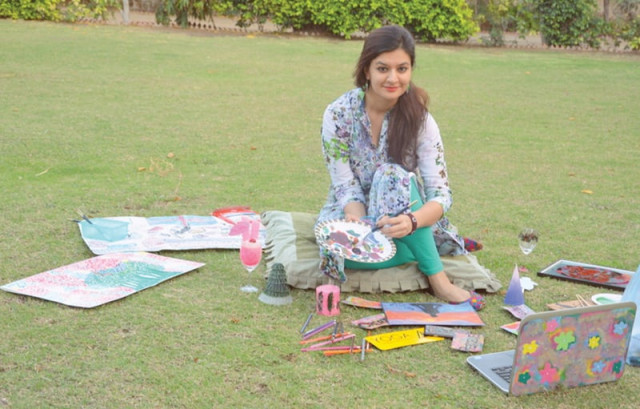Elasticities: The difference one person can make
Hashmi works with children often, particularly children from marginalised communities.

Durre Sameen Hashmi uses art to help people attain self-actualisation and
personal empowerment. PHOTO: COURTESY FARHAN ANWAR
In our city of countless millions, as the government seemingly absolves itself of its responsibilities and even large-scale private concerns have minimal impact on making Karachi a cleaner, more vibrant and sustainable city, small groups or even talented individuals are increasingly taking things into their own hands to give the metropolis life.
One such inspired and dedicated individual is Durre Sameen Hashmi, who, in a city that can be considered almost culturally dead, is using art to help people attain self-actualisation and personal empowerment.

Having studied mental health, Hashmi was exposed to people battling with extreme internal conflict, low self-esteem and loss of direction. Each time she interacted with them, however, she was taken aback and intrigued by the ideas they brought to the table. She found that they would artfully craft shapes and beautiful pottery out of clay, make flawless sketches and capture objects and ideas using varying perspectives and techniques.
So, taking art as a medium that allows people to fully understand their hidden talents and creative potential, she decided to innovate.
Believing strongly that art is a powerful medium of human expression that people enjoy being surrounded by - she named this feeling ‘Artful Envision’ - she started a campaign under the same name to engage with children and people with special needs and fill their lives with meaning, thereby also spreading that happiness to the surrounding people and spaces.
Hashmi works with children often, particularly children from marginalised communities. “Children are like blank slates and since creativity is an innate human quality, they have a lot to offer if given the right environment and direction,” she explains. “If we let their creative expression flow, they will develop powerful skills of decision-making, independent thought, perseverance and confidence.”
Using paint and various colour themes, she brings out the negativity within and transforms it into positive thoughts and vision. “Even in elite schools, minimal attention is given to harness children’s talent and energy,” she laments. “And if their parents also engage with their creativity, it would build a stronger, healthier bond between them.”
Hashmi considers art a potent tool allowing us to convey unconscious feelings or ideas that words sometimes fall short of. She explains that this is now being accepted and utilised in health-related fields, such as through art therapy in mental health, which can also be useful for the average person. In essence, art therapy is a creative mechanism enabling anyone and everyone to explore their inner self.
“For a city like Karachi, where people of all ages are exposed to daily stress triggers, the promotion of creative expression is vital,” she stresses, adding that it is a positive redirection of pent-up anger, frustration and unresolved issues.
Such endeavours, she feels, are barely present in the city - there needs to be a larger framework with, for example, the establishment of institutions that promote the exhibition of such talents. And this, in turn, will help transform Karachi into a more peaceful, culturally vibrant and tolerant city.
Farhan Anwar is an urban planner and runs a non-profit organization based in Karachi city focusing on urban sustainability issues
Published in The Express Tribune, February 23rd, 2015.



















COMMENTS
Comments are moderated and generally will be posted if they are on-topic and not abusive.
For more information, please see our Comments FAQ